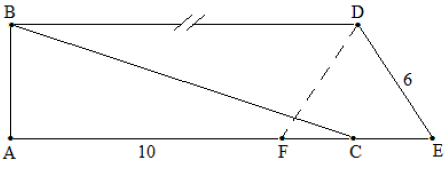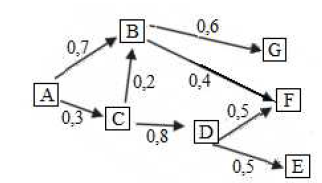Questões de Vestibular PUC-MINAS 2021 para Vestibular Medicina - Caderno 1
Foram encontradas 50 questões
Com base nessas informações, é CORRETO afirmar que o total de encomendas enviadas para as farmácias B e C foi

Na figura, os segmentos AE e BD são paralelos entre si e perpendiculares ao segmento AB; C é o ponto médio do segmento FE; DEF é um triângulo equilátero. Além disso, a distância de A até F mede 10 km, e a distância de D até E, 6 km.
Com base nesses dados, é CORRETO afirmar que a diferença entre o percurso BCED e a distância entre B e D, em quilômetros, é igual a

Os números indicados nas setas são as probabilidades de escolha que o visitante tem de ir de uma loja até outra. Nesse cenário, a probabilidade de um visitante ir de A até F é
Why do we buy into the 'cult' of overwork?
By Bryan Lufkin, 9th May 2021
Although many of us associate overly ambitious workaholism with the 1980s and the finance industry, the tendency to devote ourselves to work and glamourize long-hours culture remains as pervasive as ever. In fact, it is expanding into more sectors and professions, in slightly different packaging. Overwork isn't a phenomenon exclusive to Silicon Valley or Wall Street. People work long hours all over the world, for many different reasons.
In Japan, a culture of overwork can be traced back to the 1950s, when the government pushed hard for the country to be rebuilt quickly after World War Two. In Arab League countries, burnout is high among medical professionals, possibly because its 22 members are developing nations with overburdened healthcare systems, studies suggest. Reasons for overwork also depend on industry. Some of the earliest researchers on burnout in the 1970s asserted that many people in jobs geared toward helping others, like employees in clinics or crisis-intervention centers, tended to work long hours that led to emotional and physical exhaustion – a trend which is shown up in the pandemic, too. But millions of us overwork because somehow, we think it’s exciting – a status symbol that puts us on the path to success, whether we define that by wealth or an Instagram post that makes it seem like we're living a dream life with a dream job. Romanticization of work seems to be an especially common practice among "knowledge workers" in the middle and upper classes. In 2014, the New Yorker called this devotion to overwork "a cult".
According to Anat Lechner, clinical associate professor of management at New York University. "We glorify the lifestyle, and the lifestyle is: you breathe something, you sleep with something, you wake up and work on it all day long, then you go to sleep. Again, and again and again."
Adapted from: Home - BBC Worklife.
Why do we buy into the 'cult' of overwork?
By Bryan Lufkin, 9th May 2021
Although many of us associate overly ambitious workaholism with the 1980s and the finance industry, the tendency to devote ourselves to work and glamourize long-hours culture remains as pervasive as ever. In fact, it is expanding into more sectors and professions, in slightly different packaging. Overwork isn't a phenomenon exclusive to Silicon Valley or Wall Street. People work long hours all over the world, for many different reasons.
In Japan, a culture of overwork can be traced back to the 1950s, when the government pushed hard for the country to be rebuilt quickly after World War Two. In Arab League countries, burnout is high among medical professionals, possibly because its 22 members are developing nations with overburdened healthcare systems, studies suggest. Reasons for overwork also depend on industry. Some of the earliest researchers on burnout in the 1970s asserted that many people in jobs geared toward helping others, like employees in clinics or crisis-intervention centers, tended to work long hours that led to emotional and physical exhaustion – a trend which is shown up in the pandemic, too. But millions of us overwork because somehow, we think it’s exciting – a status symbol that puts us on the path to success, whether we define that by wealth or an Instagram post that makes it seem like we're living a dream life with a dream job. Romanticization of work seems to be an especially common practice among "knowledge workers" in the middle and upper classes. In 2014, the New Yorker called this devotion to overwork "a cult".
According to Anat Lechner, clinical associate professor of management at New York University. "We glorify the lifestyle, and the lifestyle is: you breathe something, you sleep with something, you wake up and work on it all day long, then you go to sleep. Again, and again and again."
Adapted from: Home - BBC Worklife.
Why do we buy into the 'cult' of overwork?
By Bryan Lufkin, 9th May 2021
Although many of us associate overly ambitious workaholism with the 1980s and the finance industry, the tendency to devote ourselves to work and glamourize long-hours culture remains as pervasive as ever. In fact, it is expanding into more sectors and professions, in slightly different packaging. Overwork isn't a phenomenon exclusive to Silicon Valley or Wall Street. People work long hours all over the world, for many different reasons.
In Japan, a culture of overwork can be traced back to the 1950s, when the government pushed hard for the country to be rebuilt quickly after World War Two. In Arab League countries, burnout is high among medical professionals, possibly because its 22 members are developing nations with overburdened healthcare systems, studies suggest. Reasons for overwork also depend on industry. Some of the earliest researchers on burnout in the 1970s asserted that many people in jobs geared toward helping others, like employees in clinics or crisis-intervention centers, tended to work long hours that led to emotional and physical exhaustion – a trend which is shown up in the pandemic, too. But millions of us overwork because somehow, we think it’s exciting – a status symbol that puts us on the path to success, whether we define that by wealth or an Instagram post that makes it seem like we're living a dream life with a dream job. Romanticization of work seems to be an especially common practice among "knowledge workers" in the middle and upper classes. In 2014, the New Yorker called this devotion to overwork "a cult".
According to Anat Lechner, clinical associate professor of management at New York University. "We glorify the lifestyle, and the lifestyle is: you breathe something, you sleep with something, you wake up and work on it all day long, then you go to sleep. Again, and again and again."
Adapted from: Home - BBC Worklife.
Why do we buy into the 'cult' of overwork?
By Bryan Lufkin, 9th May 2021
Although many of us associate overly ambitious workaholism with the 1980s and the finance industry, the tendency to devote ourselves to work and glamourize long-hours culture remains as pervasive as ever. In fact, it is expanding into more sectors and professions, in slightly different packaging. Overwork isn't a phenomenon exclusive to Silicon Valley or Wall Street. People work long hours all over the world, for many different reasons.
In Japan, a culture of overwork can be traced back to the 1950s, when the government pushed hard for the country to be rebuilt quickly after World War Two. In Arab League countries, burnout is high among medical professionals, possibly because its 22 members are developing nations with overburdened healthcare systems, studies suggest. Reasons for overwork also depend on industry. Some of the earliest researchers on burnout in the 1970s asserted that many people in jobs geared toward helping others, like employees in clinics or crisis-intervention centers, tended to work long hours that led to emotional and physical exhaustion – a trend which is shown up in the pandemic, too. But millions of us overwork because somehow, we think it’s exciting – a status symbol that puts us on the path to success, whether we define that by wealth or an Instagram post that makes it seem like we're living a dream life with a dream job. Romanticization of work seems to be an especially common practice among "knowledge workers" in the middle and upper classes. In 2014, the New Yorker called this devotion to overwork "a cult".
According to Anat Lechner, clinical associate professor of management at New York University. "We glorify the lifestyle, and the lifestyle is: you breathe something, you sleep with something, you wake up and work on it all day long, then you go to sleep. Again, and again and again."
Adapted from: Home - BBC Worklife.
Why do we buy into the 'cult' of overwork?
By Bryan Lufkin, 9th May 2021
Although many of us associate overly ambitious workaholism with the 1980s and the finance industry, the tendency to devote ourselves to work and glamourize long-hours culture remains as pervasive as ever. In fact, it is expanding into more sectors and professions, in slightly different packaging. Overwork isn't a phenomenon exclusive to Silicon Valley or Wall Street. People work long hours all over the world, for many different reasons.
In Japan, a culture of overwork can be traced back to the 1950s, when the government pushed hard for the country to be rebuilt quickly after World War Two. In Arab League countries, burnout is high among medical professionals, possibly because its 22 members are developing nations with overburdened healthcare systems, studies suggest. Reasons for overwork also depend on industry. Some of the earliest researchers on burnout in the 1970s asserted that many people in jobs geared toward helping others, like employees in clinics or crisis-intervention centers, tended to work long hours that led to emotional and physical exhaustion – a trend which is shown up in the pandemic, too. But millions of us overwork because somehow, we think it’s exciting – a status symbol that puts us on the path to success, whether we define that by wealth or an Instagram post that makes it seem like we're living a dream life with a dream job. Romanticization of work seems to be an especially common practice among "knowledge workers" in the middle and upper classes. In 2014, the New Yorker called this devotion to overwork "a cult".
According to Anat Lechner, clinical associate professor of management at New York University. "We glorify the lifestyle, and the lifestyle is: you breathe something, you sleep with something, you wake up and work on it all day long, then you go to sleep. Again, and again and again."
Adapted from: Home - BBC Worklife.